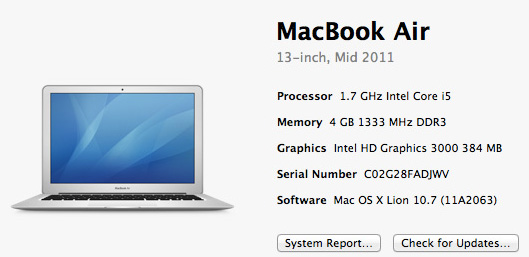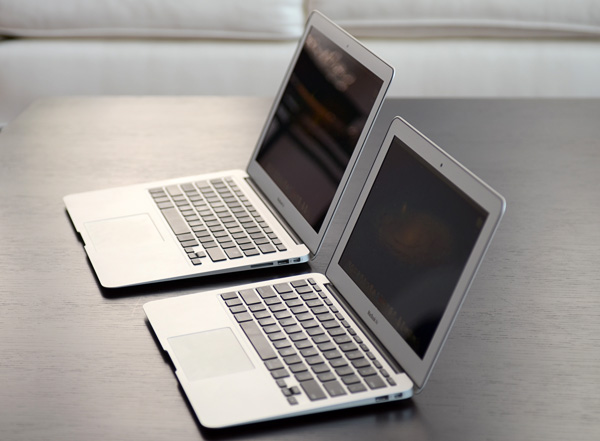The 2011 MacBook Air (11 & 13-inch): Thoroughly Reviewed
by Anand Lal Shimpi on July 28, 2011 3:25 AM EST- Posted in
- Apple
- Mac
- Intel
- Sandy Bridge
- MacBook Air
- Laptops
The CPUs
Like the iMac and MacBook Pro before it, Apple has blessed the MacBook Air with Intel's 32nm Sandy Bridge family of CPUs. Despite being named similarly to the Core i5/i7 in the MacBook Pro, only dual-core Sandy Bridge is offered in the MacBook Air. The cases are simply too small to accommodate any 32nm quad-core parts.

Also NVIDIA is completely out of the picture here. While the previous generation MacBook Air used an NVIDIA chipset with integrated GeForce 320M GPU, Apple is relying entirely on Sandy Bridge's processor graphics this round.
Apple opted for ultra low voltage Sandy Bridge CPUs all with a 17W TDP. The previous generation used a 10W part for the 11 and a 17W part for the 13, but remember those figures didn't include NVIDIA's GeForce 320M which is good for at least another 14W under load, and probably a watt or two with the GPU idle. The 17W SNB parts include memory controller and GPU, leaving only the chipset at 3.4W. Max power consumption is likely lower on the new MBAs, although typical power consumption could be higher as Sandy Bridge cores are significantly faster than the Core 2s used before.
There are three different CPUs Apple offers in the new MacBook Air lineup:
| 2011 Apple MacBook Air CPU Comparison | |||||
| 1.6GHz Core i5 | 1.7GHz Core i5 | 1.8GHz Core i7 | |||
| Available in | 11-inch (default) | 13-inch (default) |
high-end 11-inch (option) high-end 13-inch (option) |
||
| Intel Model | Core i5-2467M | Core i5-2557M | Core i7-2677M | ||
| Cores/Threads | 2/4 | 2/4 | 2/4 | ||
| Base Clock Speed | 1.6GHz | 1.7GHz | 1.8GHz | ||
| Max SC Turbo | 2.3GHz | 2.7GHz | 2.9GHz | ||
| Max DC Turbo | 2.0GHz | 2.4GHz | 2.6GHz | ||
| L3 Cache | 3MB | 3MB | 4MB | ||
| GPU Clock | 350MHz / 1.15GHz | 350MHz / 1.2GHz | 350MHz / 1.2GHz | ||
| Quick Sync | Yes | Yes | Yes | ||
| AES-NI | Yes | Yes | Yes | ||
| VT-x | Yes | Yes | Yes | ||
| VT-d | No | Yes | Yes | ||
| TDP | 17W | 17W | 17W | ||
All three parts support Hyper Threading and Quick Sync, although the latter remains mostly unused in OS X. The 11 comes with a 1.6GHz part by default while the 13 ships with a 1.7GHz chip. Both can be upgraded to the same 1.8GHz Core i7, a big change from last year's lineup where even the upgraded 11-inch model was slower than the base 13.
Turbo is fully supported at the default Intel ratios (more on confirming this later). This is actually a pretty big deal because it means that for single threaded applications you actually get similar performance to a MacBook Pro. It's only in the thread heavy stuff that the Pro machines will pull away.
The default chips for both systems comes with 3MB of L3 cache. The majority of quad-core parts only have 6MB of L3 and seem to do just fine, so I don't expect that this is too big of a deal. The upgraded 1.8GHz CPU comes with an extra MB of cache.
You'll see this in the performance section but there's just no comparison between the CPUs in the 2011 MacBook Air and what Apple shipped last year. If the MacBook Air wasn't fast enough for your last year, the 2011 models should change that.











103 Comments
View All Comments
draoug - Friday, July 29, 2011 - link
Thanks a lot for this great review. I'm very interested about the new 13' MacBook Air (i5 version) but I have also seen the 13' MacBook Pro (i5 too). In the comparisons, we see that the 13' MBP with the i7 is much more efficient than the MBA, but what about the 13' MBP with the i5 processor ?I think there isn't a big difference so I'm more on the MBA.
What do you think ?
Again, thanks for this review :)
LuckyKnight - Friday, July 29, 2011 - link
Whatever happened to your review of intels 23.97hz fixed driver?ghigh - Friday, July 29, 2011 - link
I bought a 13"/1.8/256gb last week at an Apple retail store. I unfortunately got the slower Toshiba drive. I can confirm the benchmark numbers of 160mb/s write and 205mb/s read.I exchanged the unit but got another Toshiba. :( Store won't allow any more exchanges. Called AppleCare and was unable to get any kind of resolution. I even got a call from Apple Corporate. At this point Apple is saying it is not an issue since these are just OEM parts and no performance numbers are stated.
So buyer beware--if you are set on getting the Samsung be willing to do a bunch of returns/exchanges and multiple stores until you get what you want.
tipoo - Friday, July 29, 2011 - link
Most sites are agreeing that the 13's are getting the slower drives, the 11's the faster.h00ligan76 - Friday, July 29, 2011 - link
I bought the 1.8/256 13" and have the samsung display and drive. The rub is, I am not sure this is the right machine for me. So expensive to perform at last year's level. OTOH, the 15"s get way too hot for my taste, and obviously are heavier. I guess I shouldn't complain and I should get on with enjoying it. :) I don't however see the need to keep an iPad with a laptop this light, though whatever bug is causing the long wake from sleep is sure annoying.Rasterman - Wednesday, August 3, 2011 - link
Good to know they do actually come in the 13", maybe they are only in the upgraded 13"? I would hate to spend top dollar for this and get the slower drive.versesuvius - Friday, July 29, 2011 - link
I've never had an Apple product, and I don't think I ever will, but I have always thought of Apple as a software company, maybe as a result of its rivalry with Microsoft operating systems. It is always like, Windows is like that, but Apple: Never. Now I see that it is really a hardware company, or rather a company that makes a couple of gadgets that look very nice and are built with quality in mind and are priced accordingly and then some. A hardware company with only three gadgets at a time does not have a strong future, but Apple has always come through. Very good.I have one question. Can you install Windows on this?
bji - Friday, July 29, 2011 - link
Yes, and the article even benchmarks Windows 7 on the Macbook Air. You need to read the article before responding.versesuvius - Saturday, July 30, 2011 - link
Thank you bji. The boot camp!Actually I was under the impression that boot camp runs Windows inside a virtual machine. Looks like it is not, but it has to have the Apple OS installed before one can install Windows so that it can emulate the BIOS. And you cannot install the Windows XP x64 on an Apple, but you can 7 and Vista. And since I am using Windows XP x64, the answer turns out to be "no". I should have been more clear in my question.
It would be a nice touch if Apple included dual Bios for its gadgets, so that people could install Windows on its raw hardware without the need for BIOS emulation.
Jamesbsc - Tuesday, August 2, 2011 - link
This website makes the reviews by engadget and Cnet look like kindergarten stuff. These are some brilliant people behind this website and brilliant reviews